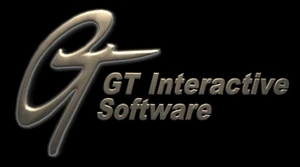
Company logo, 1999—2000.
GT Interactive Software, later known as Infogrames, Inc. and now known as Atari, Inc. is a video game company and subsidiary of Infogrames. It is notable for being the first publisher to allow developers to retain their intellectual property.
Background history[]
1990s[]
Founded in 1993 as a division of a video tape distributor known as GoodTimes Home Video, GT Interactive got its break later that same year when it saw the release of its first shareware title: The hugely popular DooM. In the following year, they hit another massive success thanks to their partnership with id Software and the release of DooM II: Hell on Earth in October, which sold over 2 million copies.
1995 saw GT obtaining publishing rights to games based on the Mercer Mayer property, including Little Critter and Little Monster. They set up displays both in Kmart and Walmart for low cost software, going so far as to receive an exclusive software supplier agreement in Walmart, meaning any and all software developers had to deal with GT in order to sell in Walmarts across the country. By January of 1996 they had again made a deal with id, obtaining the publishing rights for Quake, id's next highly-anticipated hit. That same year they entered an agreement to become the primary software supplier for all Target stores in the United States and by June, they acquired WizardWorks, known for their publishing of the Deer Hunter franchise, and FormGen, whom had the publishing rights for the Duke Nukem franchise. The next month saw their obtaining of developer Humongous Entertainment, giving GT the rights to successful children's software titles such as the Putt-Putt, Freddi Fish, and Spy Fox franchises. By November they had acquired Warner Interactive Europe, giving them access to the software market in Western Europe. Despite all the apparent success, all of these buy-outs apparently left them with a net income increase of only 11% over the previous year at $25.1 million.
In January of 1997, the company bought out the European value software publisher One Stop and in March they lost their exclusivity agreement with Walmart, who decided to buy its software directly from the publishers instead. In June they signed a deal with MTV to obtain the publishing rights for games based on Beavis and Butt-head and Æon Flux. A division of Humongous Entertainment, Cavedog Entertainment, released its first game in September, the first 3D modeled RTS Total Annihilation, to critical success. October saw the buy-out of game developer SingleTrac, owner and developer of both the Twisted Metal and Jet Moto franchises; this month also saw the definitive agreement to acquire MicroProse but this agreement was canceled by early December, causing MicroProse's stock to plummet.
In May of 1998 GT published Epic Games' Unreal and Deer Hunter II in October. Coincidentally both games sold 800,000 copies. November saw the buy-out of OneZero Media, making GT the first video game publisher to own an entertainment website on the Internet. In December they acquired both Legend Entertainment and Reflections Interactive.
The first quarter of 1999 spelled bad news for the company as they lost $90 million due to restructuring costs and this led to CEO Ron Chaimowitz to be replaced in February. Game sales this year dropped in comparison to the year before, which had dire consequences on the company's finances. A failure to release 5 major game titles and a planned relocation to Los Angeles, California did not help matters. Halfway through the year, Reflection released Driver, a critical success of a game but not enough to prevent the company announcing that they were looking for a merger or even the entire sale of the company. They chose to sell OneZero Media only six months after acquisition in July of the same year. As a potential merger or sale did not happen early enough and they were forced to fire 35% of their workforce by October. However by November Infogames Entertainment announced that they would buy 70% of GT, and the deal was completed on December 17 of that year, thus saving the company from immediate financial ruin, though they still limped away with a net loss of $254 million.
2000s[]
On May 10, 2000, GT Interactive was rebranded as Infogrames, Inc. In just under three years, they would rebrand a second time as Atari, Inc.
On October 2, 2006, Atari Inc. sold off Shiny Entertainment to Foundation 9 Entertainment. In just over a year on November 7, 2007, GameSpot reported that the company was beginning to run out of money, having lost $12 million in the first fiscal quarter of 2008. By March of 208, Infogrames returned to the company and offered to buy out all of its remaining public shares to make it the sole owner of the company and thus making it a privately held company. In April they announced their intentions of accepting Infogrames' offer and merge with them. This offer was completed on October 11.
On January 21, 2013, Atari Inc., Atari Interactive Inc., Humongous Inc., and California US Holdings, Inc. filed for bankruptcy. All three Atari companies emerged from bankruptcy a year later and had them enter into the social casino gaming industry with Atari Casino. At this point, the head of all three companies, Frederic Chesnais, stated that their entire operations consisted of a staff of only 10 individuals.
On January 3, 2017, Atari, Inc. was sued by RollerCoaster Tycoon 3 developer, Frontier Developments for not paying the company enough in owed royalties—they had only been paid $1.17 million instead of the $3.37 million they were owed, a difference of $2.2 million.
Released games[]
- Total Annihilation — September 30, 1997
- DBZ: Dead Ball Zone — September 1, 1998
